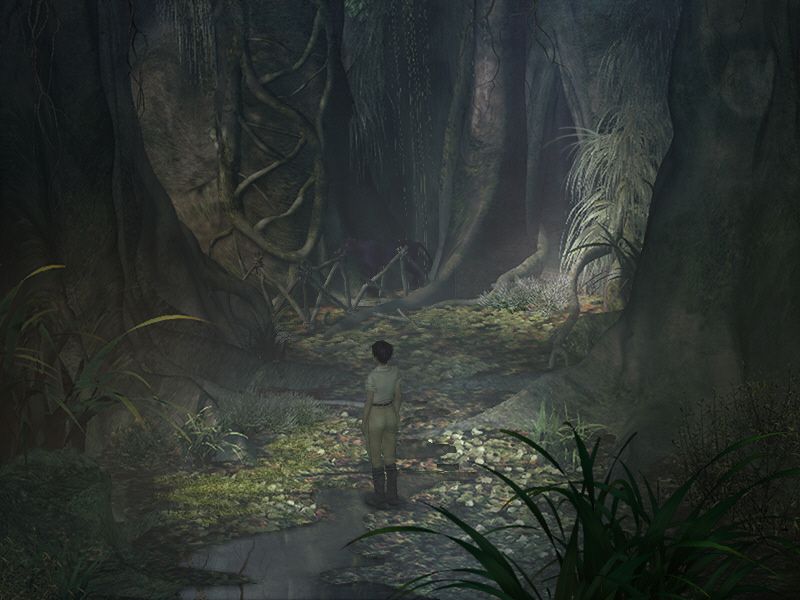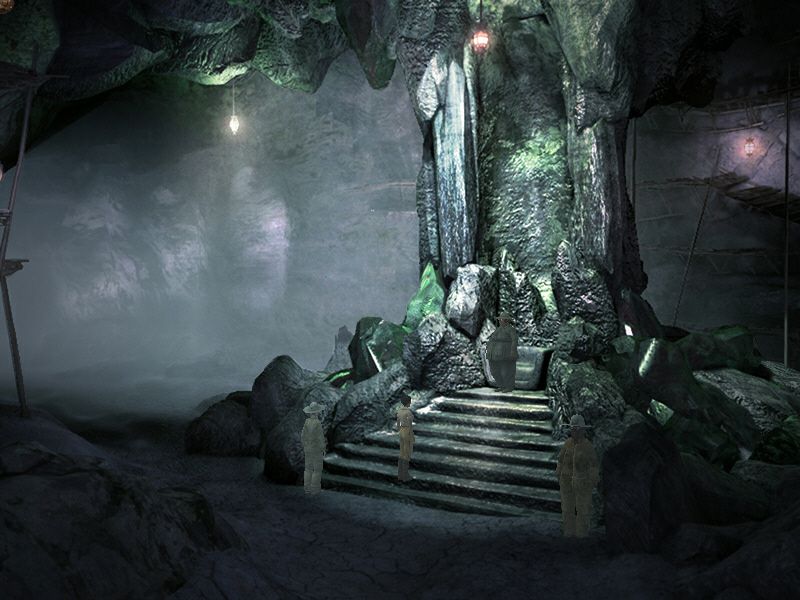Retro Replay Review
Gameplay
Paradise embraces the classic third-person point-and-click formula, guiding you through richly detailed pre-rendered environments. Your interactions hinge on identifying and clicking hot spots within each scene, then combining or using collected items to solve inventory-based puzzles. The mechanics are intuitive, requiring little in the way of hand-holding yet offering satisfying “aha” moments as you unlock new pathways and uncover hidden elements of the world.
(HEY YOU!! We hope you enjoy! We try not to run ads. So basically, this is a very expensive hobby running this site. Please consider joining us for updates, forums, and more. Network w/ us to make some cash or friends while retro gaming, and you can win some free retro games for posting. Okay, carry on 👍)
One of the game’s standout gameplay twists is the segment in which you assume the role of a black leopard, slinking through the palace grounds of Madargane. This shift in perspective breaks up the steady pace of item gathering and dialogue, introducing stealth elements and a fresh set of environmental challenges. It’s a bold design choice that refreshes the gameplay loop without straying from the core point-and-click ethos.
While most puzzles revolve around combining objects or using them in clever ways, their placement is logical, and the difficulty curve feels well calibrated. Newcomers to the genre may occasionally find themselves consulting a hint guide, but veteran adventure gamers will appreciate the blend of straightforward conundrums and a handful of mind-benders. The simple single-cursor interface keeps interaction smooth and unencumbered, allowing you to stay immersed in Ann Smith’s journey.
Graphics
Paradise features lush pre-rendered backgrounds that vividly bring the fictional Mauranian landscape to life. From the dusty red earth and sun-bleached huts of the surrounding villages to the cool, shadowy corridors of the prince’s harem, each scene is meticulously painted with striking color palettes. The static camera angles enhance the feeling of discovering a carefully composed tableau—every frame is meant to be savored.
The character models, though not cutting-edge by today’s standards, possess a unique charm. Ann’s animated expressions and the subtle movements of supporting characters give the world a sense of authenticity. While close-up shots can reveal polygonal edges, the overall visual direction leans into a painterly aesthetic that holds up remarkably well in conveying mood and setting.
Lighting and environmental effects further augment the atmosphere. You’ll notice the glow of torchlight flickering across tile floors, the heat haze hovering over the savanna, and the soft rays piercing palace windows at sunrise. These details elevate the game’s visual storytelling and help ground you in the mysterious political intrigue of Maurania.
Story
At its heart, Paradise is an amnesia-driven narrative focusing on Ann Smith, a woman with no memory of her journey to Africa or the events that led to her being held in a harem. The premise unspools through elegantly written dialogues and journal entries, both revealing personal backstory and hinting at the larger socio-political forces at play in Maurania. You’ll find yourself as eager as Ann to uncover the truth behind her identity and purpose.
As Ann traverses villages, interacts with local peasants, and negotiates with the enigmatic prince, the stakes steadily rise. The game tackles themes of colonial legacies, tribal alliances, and personal sacrifice, weaving them into a cohesive tapestry that feels weighty without becoming preachy. Secondary characters—from the loyal guard who questions his orders to the rebel leader plotting a coup—are given ample depth, enriching the narrative with conflicting motivations and moral ambiguity.
Perhaps the most compelling aspect is the gradual revelation that Ann’s connection to Maurania is far deeper than mere coincidence. Each new memory fragment enhances your understanding of her role in the country’s future and invites you to reflect on issues of power, belonging, and destiny. The pacing of these revelations is skillfully handled, ensuring that you’re always motivated to press forward in search of answers.
Overall Experience
Paradise is a thoughtful, beautifully crafted adventure that will appeal to fans of classic point-and-click titles like Syberia and The Longest Journey. Its measured pace allows you to savor both the puzzles and the unfolding drama, and the leopard-control segment injects a welcome vein of variety into the proceedings. If you enjoy stories that blend personal mystery with political intrigue, this game delivers on both fronts.
The game isn’t without minor flaws—a handful of pixel-hunt moments and occasional translation quirks can frustrate—but they scarcely detract from the overall ambiance. Instead, they feel like part of the genre’s nostalgic charm, reminding you of the era when adventure games prized atmosphere and narrative complexity over action setpieces.
Whether you’re drawn by the exotic setting, the compelling protagonist, or the clever puzzles, Paradise offers an engrossing journey that lingers long after the credits roll. It’s a captivating example of how traditional mechanics, when executed with care and creativity, can still surprise and delight players in the modern era. For anyone seeking a richly woven tale in a visually stunning world, this adventure is well worth the trip to Maurania.
 Retro Replay Retro Replay gaming reviews, news, emulation, geek stuff and more!
Retro Replay Retro Replay gaming reviews, news, emulation, geek stuff and more!









Reviews
There are no reviews yet.